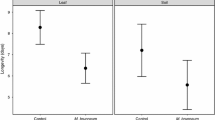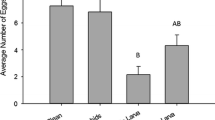Abstract
Experience of nonhost plants by phytophagous insects may alter their foraging and oviposition responses to these plants. Using the diamondback moth (DBM) Plutella xylostella (L.), its host-plant Chinese cabbage, and a nonhost-plant Pisum sativum (pea) as a model system, we examined whether experience of the nonhost plant by adults can induce oviposition on the nonhost plant. Naive DBM females did not accept pea for oviposition in either no-choice or choice conditions, whereas females with prior experience of pea laid up to 20% of their eggs on this plant. Naive females reduced their oviposition, but experienced females did not refrain from laying eggs in a nonhost-plant environment. Such habituation to nonhost plants could lead to host range expansion in phytophagous insects and increase mortality of pest insects in diversified crop systems.

Similar content being viewed by others
References
Ampong-Nyarko, K., Reddy, K. V. S., Saxena, K. N., and Seshu-Reddy, K.V. 1994. Chilo partellus (Swinhoe) (Lep., Pyralidae) oviposition on non-hosts: a mechanism for reduced pest incidence in intercropping. Acta Oecol. 15:469–475.
Andow, D. A. 1991. Vegetational diversity and arthropod population response. Annu. Rev. Entomol. 36:561–586.
Bellows, T. S. and Headrick, D. H. 1999. Arthropods and vertebrates in biological control of plants, pp. 505–516, in T. S. Bellows and T. W. Fisher (eds.). Handbook of Biological Control: Principles and Applications of Biological Control. Academic Press, San Diego.
Bernays, E. A. 1995. Effects of experience on host-plant selection, pp. 47–64, in R. T. Cardé and W. J. Bell (eds.). Chemical Ecology of Insects 2. Chapman & Hall, New York.
Boggs, C. L. and Freeman, K. D. 2005. Larval food limitation in butterfly: effects on adult resource allocation and fitness. Oecologia 144:353–361.
Cunningham, J. P., West, S. A., and Zalucki, M. P. 2001. Host selection in phytophagous insects: a new explanation for learning in adults. Oikos 95:537–543.
Gupta, P. D. and Thorsteinson, A. J. 1960. Food plant relationship of the diamondback moth [Plutella Maculipennis (Curt.)]. I. Gustation and olfaction in relation to botanical specificity of the larvae. Entomol. Exp. Appl. 3:214–250.
Honěk, A. 1993. Intraspecific variation in body size and fecundity in insects: A general relationship. Oikos 66:483–492.
Janz, N. 2002. Evolutionary ecology of oviposition strategies, pp. 349–376, in M. Hilker and T.Meiners (eds.). Chemoecology of Insect Egg and Egg Deposition. Blackwell Verlag, Berlin.
Janz, N., Nyblom, K., and Nylin, S. 2001. Evolutionary dynamics of host-plant specialization: a case study of the tribe Nymphalini. Evolution 55:783–796.
Jermy, T. 1987. The role of experience in the host selection of phytophagous insects, pp. 143–157, inR. F. Chapman, E. A. Bernays, and J. G. Stoffolano (eds.). Perspectives in Chemoreception and Behaviour. Springer-Verlag, New York.
Larsson, S. and Ekbom, B. 1995. Oviposition mistakes in herbivorous insects: confusion or a step towards a new host plant? Oikos 72:155–160.
Liu, S. S. and Liu, T. X. 2006. Preimaginal conditioning does not affect oviposition preference in the diamondback moth. Ecol. Entomol. 31, in press.
Liu, S. S., Li, Y. H., Liu, Y. Q., and Zalucki, M. P. 2005. Experience-induced preference for oviposition repellents derived from a non-host plant by a specialist herbivore. Ecol. Lett. 8:722–729.
Löhr, B. and Rossbach, A. 2004. Diamondback moth, Plutella xylostella (L.), on peas in Kenya: impact of the host shift on the pest and its parasitoid, pp. 133–139, in N. M. Endersby and P. M. Ridland (eds.). The Management of the Diamondback Moth and Other Crucifer Pest: Proceedings of the 4th International Workshop. Regional Institute Ltd, Gosford, NSW, Australia.
Papaj, D. R. and Prokopy, R. J. 1989. Ecological and evolutionary aspects of learning in phytophagous insects. Annu. Rev. Entomol. 34:315–359.
Schoonhoven, L. M., Jermy, T., and Van Loon, J. J. A. 1998. Insect–Pant Biology: From Physiology to Evolution. Chapman & Hall, London.
Strong, D. R. 1979. Biogeographic dynamics of insect–host plant communities. Annu. Rev. Entomol. 24:89–119.
Termonia, A., Hsiao, T. H., Pasteels, J. M., and Milinkovitch, M. C. 2001. Feeding specialization and host-derived chemical defense in chrysomeline leaf beetles did not lead to an evolutionary dead end. Proc. Natl. Acad. Sci. USA 98:3909–3914.
Turlings, T. C. J., W™ckers, F. L., Vet, L. E. M., Lewis, W. J., and Tumlinson, J. H. 1993. Learning of host-finding cues by hymenopterous parasitoids, pp. 51–78, in D. R. Papaj and A.C.Lewis (eds.). Insect Learning: Ecological and Evolutionary Perspectives. Chapman & Hall, New York.
Zalucki, M. P., Clarke, A. R., and Malcolm, S. B. 2002. Ecology and behaviour of first instar larval Lepidoptera. Annu. Rev. Entomol. 47:361–393.
This study was funded by the National Natural Science Foundation of China (Project No. 30471146). We thank Myron Zalucki, University of Queensland, Australia, for thoughtful comments on the manuscript.
Author information
Authors and Affiliations
Corresponding author
Rights and permissions
About this article
Cite this article
Zhang, PJ., Liu, SS. Experience Induces a Phytophagous Insect to Lay Eggs on a Nonhost Plant. J Chem Ecol 32, 745–753 (2006). https://doi.org/10.1007/s10886-006-9032-0
Received:
Revised:
Accepted:
Published:
Issue Date:
DOI: https://doi.org/10.1007/s10886-006-9032-0




